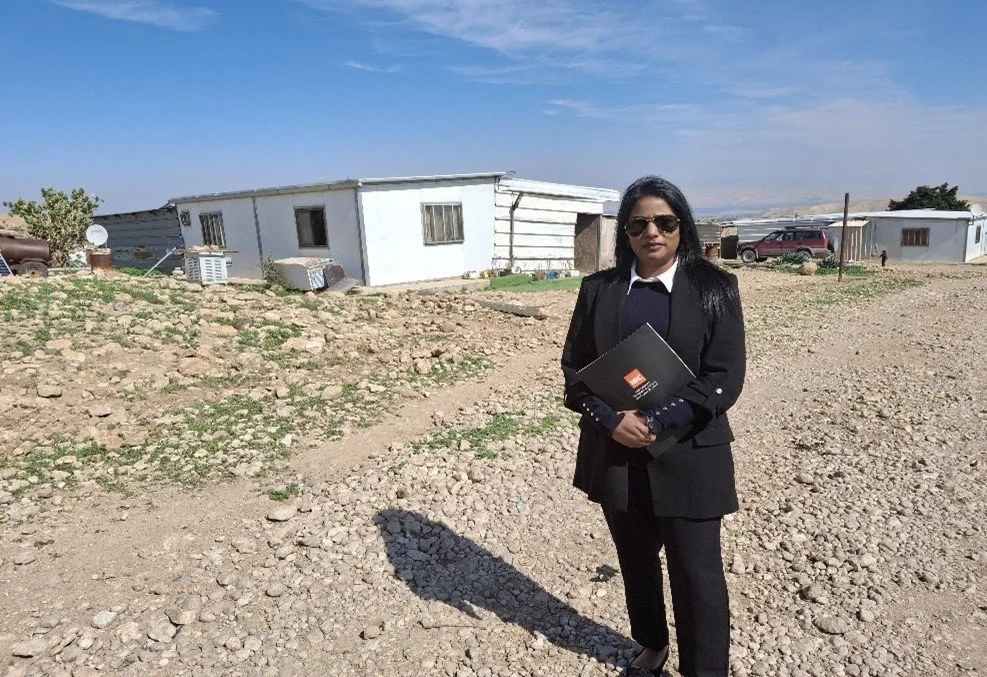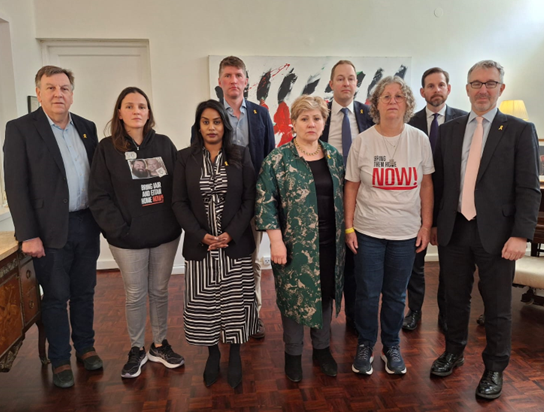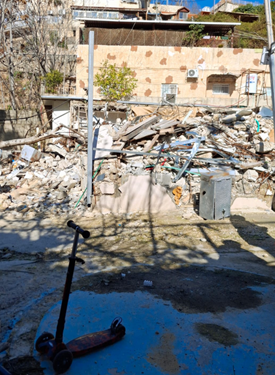My visit to the occupied Palestinian Territories, West Bank, Jerusalem and Tel Aviv
Earlier this year, I had a deeply moving visit to the Occupied Palestinian Territories, West Bank, Jerusalem and Tel Aviv.
My visit was on official capacity as a member of UK Parliament’s Foreign Affairs Committee to support our year-long and ongoing enquiry into the Israeli-Palestinian conflict.
We travelled to the region to see the reality of what is happening on the ground.
Over four days I visited Riyadh, Jordan, the Occupied Palestinian Territories (the West Bank, including Ramallah, and East Jerusalem) and Israel (West Jerusalem and Tel Aviv). It was a sobering trip, but an invaluable one.
As the daughter of a community who have faced persecution and fled an armed conflict, I found this a hugely emotional and tough diplomatic trip. In Israel and in Palestine the depth of feeling on both sides is palpable.
The trauma they are suffering cannot be overstated.
Occupied Palestinian Territories
In the Occupied Palestinian Territories (OPT), we travelled from Jordan with heavily reinforced 4x4s. We were still subject to IDF guns pointed directly at us.
Ramallah felt tense, the OPTs even tenser.
(West bank with support from the Norwegian refugee council)
Travelling through the West Bank, I saw how even access to water, to rivers and streams, is limited – and how intimidating this is for Palestinian people trying to go about their daily lives. The fear and very real threat of Israeli State sanctioned intimidation and settler violence is never far away.
I was the only MP able to meet the women in West Bank. They told me devastating stories about the lack of access to basic healthcare and sanitation products that they need. The lack of food for their babies and the fear of travelling through dozens of armed check points to the nearest medical centre to seek help.
I saw firsthand the daily reality of intimidation and the appalling realities of settler violence and displacement.
Jerusalem and Tel Aviv
Visiting Israel, I saw a nation that is deeply traumatised and grieving. Every single person has a story of being touched by the terror of October 7th. I met with a former hostage and with the families of those still held.
I went into Hostage Square and was there the day of the funerals of Shiri Bibas and her sons.
I walked through hostage square, and felt and saw the pain of those families who will never again see their loved ones, and those still wondering when their loved one – still held hostage- or their body will be returned home.
I was there on the day of the Bibas family funerals - a mother and her two young babies who were killed. Grief permeates their society, which I fear may never recover. We must show that, as global partners, we understand that grief.
By chance, I bumped into the Israeli Opposition leader, Yair Lapid, in Hostage Square, where he had come to pay his respects. We had a heartfelt conversation standing in the shade of the Memorial Tree. He thanked me for being there, and for showing Israelis that they have international friends who want to work to find a way forward towards peace.
I met former hostage families who are themselves calling for peace, and who feel the pain of what is happening on the Palestinian side.
They want our hand of peace and friendship, and they want us to understand what they are going through. Many are unable to think about what’s next, living in the immediacy of grief and still waiting for the hostages to come home. The release of hostages and the bodies of the dead is paramount.
I spoke to as many people as possible and was struck by widespread frustrations with the political class. Sitting down with counterpart Foreign Affairs Committee Members, and other members of the Knesset, was troubling. I saw no will or desire to push forward for peace. That was sobering and, frankly, quite depressing.
The rhetoric of Israeli Ministers– in public and private – about the rights of Palestinians and future of Palestine is appalling and dehumanising.
We also met with countless Israeli NGOs, academics, and peace activists. Their empathy and understanding of what Palestinian people are facing showed the best of humanity. Meeting them, seeing their kindness and courage, filled me with hope.
We must remember that they, too, are struggling against a government that does not seem to be listening to them.
In the Old City, East Jerusalem, I walked through the rubble of family homes, of lives once lived and felt the fear of those still living under the violence of occupation.
The brave Palestinian man who showed us around has previously faced threats to his life for speaking out – his own home demolished as a warning to others. I was accompanied by a brave Israeli woman, who worked tirelessly with a local NGO to support Palestinians in Jerusalem. The friendship between her and the older Palestinian man, who showed us what was once his home, gave me hope for a community that could one day live side by side.
He told me, he would be expecting to receive a call after we had left from the Israeli security services, warning him of speaking to foreign visitors or media. But that he would never stop using his voice to speak up for Palestinians who have lived in Jerusalem for generations.
Despite these threats, their resilience and determination to defend their communities, under threats of violence and constant surveillance, is unwavering. Their will to live and their will to freedom is humbling.
A few hours after we parted, the area in the OPTs that I had travelled to meet with women and children turned ‘Red’ – meaning ‘Do Not Travel’ - on the map. My thoughts turned to the baby I held in the West Bank a few hours earlier: what would happen to them now?
Next steps
I come home determined to redouble my efforts to work for peace. What I saw did not give me confidence that a long-term resolution will be forthcoming. But we must not give up hope and must continue to push forward for an agreement.
The UK must continue to push for the unhindered access to and provision of aid, to resist the Knesset’s Bill imposing crippling restrictions on NGOs. Shortly after my return, Israel stopped the entry of all aid into Gaza. It has now been months since aid and medical supplies entered Gaza. We must condemn this unequivocally.
Hamas military capabilities need to be eliminated. An ideology is much harder to root out but with time, peace and education this is possible. The Palestinian Authority needs political reform so that they have the confidence of the Palestinian people – which they currently lack. The Palestinians need leaders who will speak for them, protect them, and work in their best interests for a peaceful future.
Neither side can do this alone. I remain convinced of the invaluable power of diplomacy. International allies, and allies in the region, have a seismic role to play in the pursuit of peace.
As a member of the powerful UK Foreign Affairs Committee, I am not someone who gives a running commentary on international matters – but I continue to do all I can, in public and in private, to bring peace. I won’t forget what I’ve seen or heard for the rest of my life.
The Foreign Affairs Committee will soon publish its formal findings in a report.
I will not give up hope for a free Palestine - for their statehood - alongside a safe and secure Israel, so that the region may finally see a lasting peace.
My thanks go to the brave Palestinian people and Israeli NGO workers who put their lives at risk to show us the realities I have described, as well as to the British consulate’s diplomatic and security staff for keeping us safe.
I have spoken about my experience and what I have seen firsthand in the West Bank, Ramallah and in the old city in Jerusalem at a debate on the rights of Palestinians in Parliament; you can watch this online, read it on Hansard, or see coverage in the media
Since my election as MP for Stratford and Bow, I have been vocal on this issue. You can learn more about my work here:
And since my return from the region, I have:
Called on the Government to meet words with action by escalating our sanctions against the Israeli government and its blatant violations of international law. You can watch this here.
Co-signed a letter with 73 Labour MPs urging the Government to support recognition of Palestine. You can read that letter here.
Once again met with my friend, the Palestinian Ambassador, to discuss the urgent situation in Palestine.
Spoken in the media about the urgency of Palestinian statehood.
Following Israel’s announcement of a huge expansion of illegal settlements, spoke to the World Tonight on BBC Radio. We are seeing the annexation of the West Bank in real time, in their words to “prevent the establishment of a Palestinian state". You can listen to the interview here.
I’ve repeatedly spoken in Parliament to stress the urgency of recognising the Palestinian state.
I’ve asked the Secretary of State, David Lammy, about our role in the two-state solution, and when the UK will finally recognise Palestinian statehood.
Raised the urgency of Palestinian statehood with the Minister for the Middle East here.
Once again raised the annexation of the West Bank in the House of Commons chamber, and I asked the Government to look again at stopping all settler goods coming into the UK. You can watch me ask about the West Bank here.
Called on the Government to act now and sanction the Israeli defence minister Katz, and asked what role the UK will play in the reconstruction of Gaza. You can watch me ask about Gaza here.
Again spoke in the House of Commons to raise the urgency of recognising the State of Palestine.
I have raised some my experience with the Secretary of State, David Lammy.
I also spoke at the formal evidence session of the Foreign Affairs Committee, asking the Minister for the Middle East, Hamish Falconer MP, about violence in the West Bank, the displacement of Palestinians from Jenin, and what the UK is doing to help secure the release of all remaining hostages.
You can learn more about my work on this issue here.







